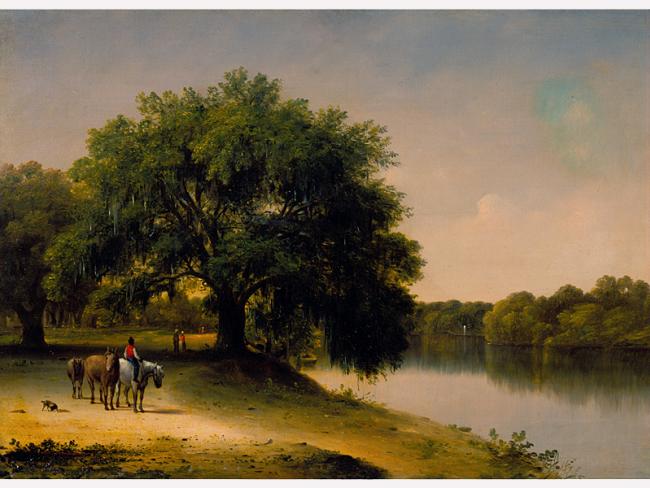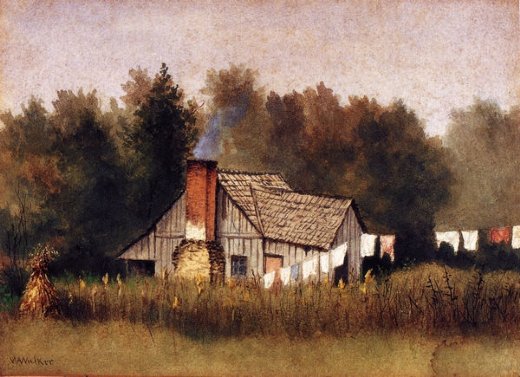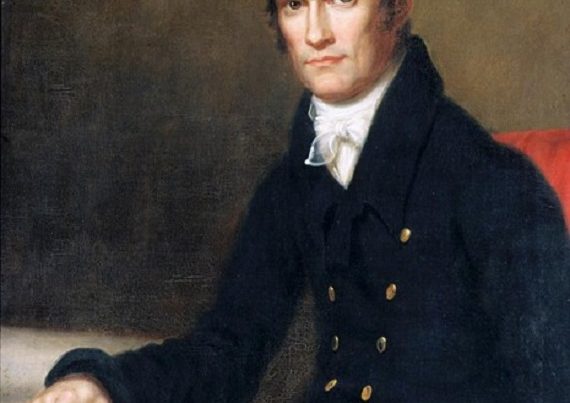Since the end of the War, with the Yankees in the ascendancy, the dominant ideas in the union have been mainly change, innovation, progress, and their near-of-kin. Sultan Donald the Magnificent re-confirmed this in his Inaugural Address in January:
‘And, right now, our nation is more ambitious than any other. There’s no nation like our nation. Americans are explorers, builders, innovators, entrepreneurs and pioneers. The spirit of the frontier is written into our hearts. The call of the next great adventure resounds from within our souls. Our American ancestors turned a small group of colonies on the edge of a vast continent into a mighty republic of the most extraordinary citizens on Earth. No one comes close. Americans pushed thousands of miles through a rugged land of untamed wilderness. They crossed deserts, scaled mountains, braved untold dangers, won the Wild West, ended slavery, rescued millions from tyranny, lifted millions from poverty, harnessed electricity, split the atom, launched mankind into the heavens and put the universe of human knowledge into the palm of the human hand. If we work together, there is nothing we cannot do and no dream we cannot achieve.’
That kind of thinking, in general, a Southerner cannot abide. Some of those accomplishments are noble, and we do not reject all change, of course, but making The New the center of our life, its guiding ideal, has had, and will continue to have, disastrous consequences. Man in such a system becomes rootless and falls into despair, and the creation itself, to quote St Justin Popovich, becomes ‘a slaughterhouse.’ The Kentucky agrarian Wendell Berry offers a longer counterpoint:
‘The paramount doctrine of the economic and technological euphoria of recent decades has been that everything depends on innovation. It was understood as desirable, and even necessary, that we should go on and on from one technological innovation to the next, which would cause the economy to “grow” and make everything better and better. This of course implied at every point a hatred of the past, of all things inherited and free. All things superseded in our progress of innovations, whatever their value might have been, were discounted as of no value at all.’
And once again he declaims, ‘As industrial technology advances and enlarges, and in the process assumes greater social, economic, and political force, it carries people away from where they belong by history, culture, deeds, association, and affection.’
Dixie understands that without history, traditions, customs, and the like, life is dull and meaningless. Yet such a normative worldview is attacked relentlessly in the modern United States. Examples to encourage Southrons not to abandon our heritage would be extraordinarily helpful in the midst of this maelstrom.
And they do exist, thanks be to God. The first three months of the year feature some of the most beloved saints of the Celtic lands and peoples, to which and to whom the South has deep ties: St Kentigern Mungo, Patron Saint of Glasgow and a chief apostle of Scotland (13 Jan.), St Ita of Kileedy, ‘Foster-Mother of the Irish Saints’ (15 Jan.), St Teilo, a father to the Welsh (9 Feb.), St Patrick, the Enlightener of Ireland (17 March), and so forth. Among their number is also St Oncho (sometimes spelled ‘Onchu’) of Clonmore, Ireland (Feast Day celebrated 8 Feb.; he reposed near the end of the 6th century AD). A short vita of the saint shows his significance for Southerners today: ‘Saint Oncho was an Irish pilgrim, poet, guardian of the Celtic traditions, and a collector of holy relics. While pursuing his search for memorials of the Irish saints he died at Clonmore monastery, then governed by Saint Maidoc, and his body was enshrined there together with the relics he had gathered’ (Celtic and Old English Saints).
Like St Oncho, Southerners faithful to our forebears are pilgrims, bards, guardians of Dixie’s traditions, and collectors of precious relics:
Pilgrims, for we are not of the Yankee culture that surrounds us;
Bards, for the words of some in Dixie are still lit with the apocalyptic fire of the prophets of old, revealing truth and error;
Guardians of tradition, for the attacks upon our past have not ceased; and
Collectors of relics, for what of our history has survived has been scattered through neglect and through malice and must be gathered again.
St Oncho set out with a firm resolution and good intention, and so must Southerners also. In a longer account of St Oncho’s life, we are given the pattern and motivations to imitate:
‘The holy man formed his resolution of visiting each place, throughout our whole island, in which he thought there might be the most remote chance for discovering or procuring relics, of any Irish saints. He had hoped, that such a collection might afterwards serve to increase devotion, and preserve the memory of those pious servants of God, among the people.’
Along the way, we should not be surprised if we are visited by wonders:
‘…having nearly accomplished his original purpose, he came to the flourishing monastery of Clonmore, in Leinster, over which the illustrious Maidoc or Aidus, son to Eugenius of the Leinster family, then presided as abbot. St. Onchu received kind hospitality, and he demanded some memorial from this holy superior. Through humility, however, Maidoc refused such a request; when, it is said, his finger fell to the ground in a miraculous manner. Our saint immediately took it up, and placed it among his other relics.’
If we are diligent in our work, and should the All-Holy Trinity bless it, as we pray He will, we will be crowned with the same success as him:
‘Such purposes he accomplished; for, whatever monastery or cell, he visited, furnished some contribution to the store, he had previously acquired. Not only did he obtain memorials of the dead; but, he received even certain gifts or articles, from pious men, whose reputation for sanctity had been already established, in the Irish Church. All of these precious treasures, Onchu deposited, in the same reliquary.’
St Oncho was buried in the Monastery of Clonmore along with his treasury of holy relics. Clonmore and all of Ireland have been abundantly blessed by his efforts. Anyone willing can still visit the site and receive the Grace of God that is present in abundance because of the presence of so many saints.
Will there be sites like Clonmore across the South, housing the treasures of our people? That depends on us. If we want the answer to be Yes, then may this prayer be often in our mouths and in our hearts as we labor to that end:
‘Following thine example, most Holy Oncho,
we pray for strength to defend all precious and holy things,
resisting to the end all attempts at desecration and sacrilege
by the agents of the godless,
that in all things glory may be given to Christ our God.’
(Celtic and Old English Saints)







I’m no fan of Yankees and I believe our divorce from them is overdue to be perfected. That said, while we’re stuck in this contentious relationship, I believe credit should be given where due, specifically, to President Trump for his admiration for and defending attacks against the South. He has been consistent for many years. Recall the “fine people” remark? (Clearly referring to southern heritage advocates) The woke Left and uninformed are still ranting about that. Vetoing the infamous Defense Authorization Act. There’s more. So let’s say we be a less insulting toward the man.
Agreed. Trump, Vance , and Musk have done great things for Europe , as well. Their EU is as odious as the Federal government of the “United” States.
I tend to agree. I could be wrong but guys like Trump seem like they are willing to listen (and learn)
Excellent article. I am always glad to read about the Celtic connections with the South. My one disappointment is with the reference to St. Mungo of Glasgow. It is my understanding that he was in opposition to the Celtic Church and favored the Roman institution.
Amen!